key hashtags: asam, audio, colonization, comedy, cultural appropriation, demographics, documentary, education, enclave, ethnicity, event, film, foodways, health care, history, humor, hybridity, identity, immigration, labor, law, LGBT, literature, media, men, mental health, mixed heritage, mixed race, model minority, music, photo, politics, quote, race, racism, redevelopment, statistics, stereotypes, video, visual art, women
Don't wanna be here? Send us removal request.
Text
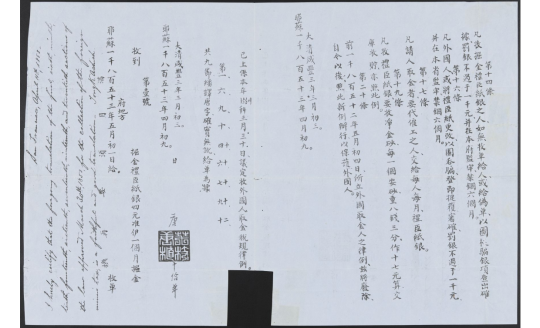
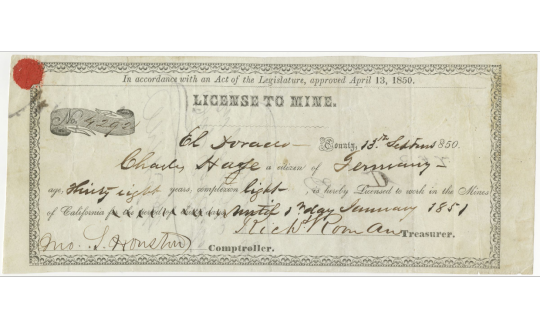
The CA State Library has digitized its collection of Foreign Miners Tax documents, 1850-1867, and they are now available online. This small collection primarily contains documents related to the collection of the tax in San Joaquin County, showing how many licenses were sold and the revenue collected. Among the items is a Chinese translation of the law, and a copy of a paid Foreign Miners Tax License from 1850.
In 1850 the first California state legislature passed a Foreign Miners Tax Law, levying a twenty dollars per month tax on each foreigner engaged in mining. The law was repealed in 1851, only to be reenacted in 1852 and set at $3 a month. By 1853 the Foreign Miner's Tax was increased to $4 a month.
116 notes
·
View notes
Video
instagram
On April 26, 1968, as an architecture student at the University of Pennsylvania, Kiyoshi Kuromiya and some friends held a demonstration against the use of napalm in Vietnam by announcing that a dog would be burned alive with napalm in front of the university library. Thousands turned up to protest, only to be handed a leaflet reading: “Congratulations on your anti-napalm protest. You saved the life of a dog. Now, how about saving the lives of tens of thousands of people in Vietnam.” . . Born in the Heart Mountain, WY concentration camp in 1943, Kiyoshi Kuromiya (May 9, 1943 – May 10, 2000) was a lifelong activist advocating for civil rights, gay liberation, and proper HIV/AIDS treatment and resources, and against the Vietnam War. . . . Kuromiya spent the spring and summer of 1965 in the South fighting for civil rights, and became friends with Dr. Martin Luther King Jr. When King was assassinated, Kuromiya helped take care of the King children. . . Kuromiya participated with the Gay Pioneers in the first organized gay and lesbian civil rights demonstrations, “the Annual Reminders,” held at Independence Hall and the Liberty Bell each Fourth of July from 1965 to 1969. He was one of the founders of Gay Liberation Front-Philadelphia and served as an openly gay delegate to the Black Panther Convention that endorsed the gay liberation struggle. Diagnosed with AIDS in 1989, Kuromiya became a self-taught expert on the disease, operating under the mantra “information is power.” He founded the Critical Path Project, which provided resources to people living with HIV and AIDS, including a newsletter, a library, and a 24-hour phone line. . . . Learn more about Kuromiya in this remembrance video by friend Alfredo Sosa at https://vimeo.com/12474786
#Kiyoshi Kuromiya#activist#zinneducationproject#history#bio#lgtbq#Asian American#SGV#San Gabriel Valley
29 notes
·
View notes
Photo

In 1968, the AmeriCong announced that a dog would be burned alive in front of University of Pennsylvania’s Van Pelt Library. 2000 people showed up in protest. They were given leaflets.
“Congratulations on your anti-napalm protest. You saved the life of a dog. Now, how about saving the lives of tens of thousands of people in Vietnam.”
From his birth in an internment camp to marching as a high schooler in Selma and being brutalized by horseback police to starting the Critical Path Project to educate people living with HIV/AIDS on health and activism to his 1999 suit, Kuromiya v United States, for the right to medical marijuana, Kiyoshi Kuromiya’s life is a celebration of direct action and education.
Today, May 19th, is National API HIV/AIDS Awareness Day. HIV is a political issue. HIV demands collective and systemic change. Here are notes from a BARS meeting session earlier this year on API folk and HIV/AIDS: https://docs.google.com/document/d/1U8Dw9MP-t9seZkTrw6Mvai3b068UWrTnoaXpHAgZkm4/edit
Interview with Kuromiya: https://thescene.com/watch/them/kiyoshi-kuromiya
2K notes
·
View notes
Text
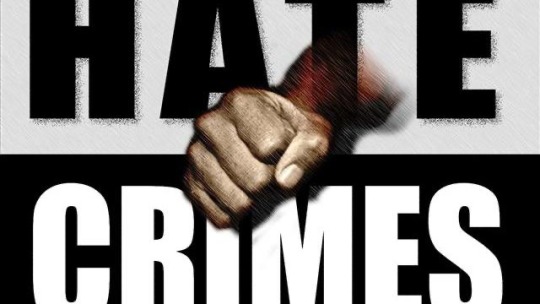
07/02/20
2,120 hate incidents against Asian Americans reported during coronavirus pandemic
More than 2,100 anti-Asian American hate incidents related to COVID-19 were reported across the country over a three-month time span between March and June, according to advocacy groups that compile the data. The incidents include physical attacks, verbal assaults, workplace discrimination, and online harassment.
The online tool is available in multiple languages and allows users to report the information with the promise that personal information will be kept confidential. On Wednesday, the advocacy groups released an analysis of the incidents reported through June 18 in California, where about 40 percent of the 2,120 hate incidents took place. The groups released the national data to CBS News after an inquiry.
51 notes
·
View notes
Video
instagram
While racist stereotypes have harmed the Chinese in America by fueling racial violence and policy, especially during the era of Chinese Exclusion, they have proven beneficial to companies in the form of profitable merchandise. This American-produced latex dog toy (pictured), made for a “very important pet,” depicts a slant-eyed Asian character in a vague karate uniform and pose. Products of this kind reduce Chinese personhood to a monolithic Asian stereotype and literally objectify and demote Asians to a status below that of an animal.⠀⠀⠀⠀⠀⠀⠀⠀⠀⠀⠀⠀⠀⠀⠀
While the production date of the toy is unknown, racist stereotypes of Asians and other races persist in merchandising, such as the notorious Abercrombie & Fitch T-shirts of 2002. These shirts included Asian caricatures like Wong Brothers Laundry Service, which featured the tagline “two Wongs can make it white.” ⠀⠀⠀⠀⠀⠀⠀⠀⠀⠀⠀⠀⠀⠀⠀⠀⠀⠀ Photo Credit: Latex Dog Toy. Museum of Chinese in America (MOCA) Collection.
12 notes
·
View notes
Link
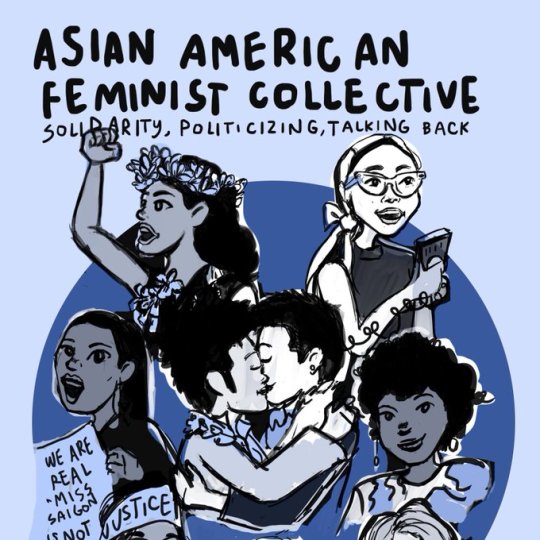
#Nov. 2019#Asian American Feminist Collective#Cover art by @angel_trazo#history issue#zine#zine culture#free#donations welcomed
16 notes
·
View notes
Photo




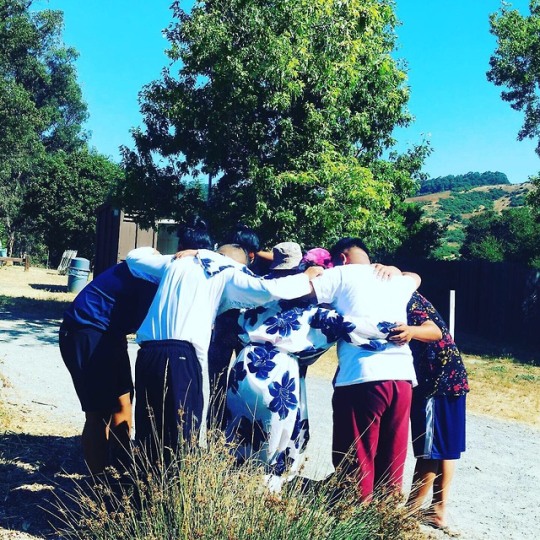
Developing “ MAIDHAR” with Bay Area Bhutanese Youth Group storytelling performance has been such a great experience.
Learning their lives, culture, stories and history bridges our story and history as well. Repeating tragic stories from past to present is on going and we are trying hard to address that grieves through our truthful storytelling art piece so we are not repeating that history over and over again. We have reasons to do and share with people and public together.
Seeing displacement in here and other countries through time period, people leave their beloved ones from their own countries, tortured from the truth, separating from the family members, political and economical cause of people to be fled and sheltered… so many people from different countries through times…. my ancestor was one of them in 1907… leaving his beloved country and family to take back their country from the colonization.
I could feel their pain and struggles through “MAIDHAR” story. Walls, Borders, Wars, Camps, Identity, Displacement, Culture, Roots and Ancestors and Resists bridge stories in the world. Bay Area Bhutanese Youth, they are still young, most of them were born in refuge camp but they are taking their steps to share their stories, untold histories and try to remember their history and identity and taking leadership to continue this struggles into positive force for the hope. Sharing not only their communities but also all the people who are struggling from separated family and their ancestral land that they belong to is part of reason that they are sharing their stories.
Their work evolves every time with their passion and importance to face on reality on humanity crisis that is same to myself. Why we are sharing this work together through arts, we believe that doing performance as action, when we address our stories, it transforms ourselves and we believe that it will transform others as well.
Their on going work will be present:
August 2nd and 3rd at Flight Deck (Friday for their community and Saturday for public) and Oct 5th at Peralta Hacienda Hostorical Park and 2020 at Yerba Buena Center For the Arts with Dohee Lee’s Puri Arts.
#the arts#Dohee Lee#Puri Arts#storytelling#Bay Area Bhutanese youth#South Asian#South Asian American#Bhutan#Bhutanese American#displacement
5 notes
·
View notes
Photo


clara chan lee (in hat) and emma hoo tom (left), becoming the first chinese american women to register to vote in the US.
the historic act is remembered in the alice street mural project (alice/14th st, oakland).
photo from the oakland tribune, november 8, 1911. via oaklandwiki, gene anderson, and oaklandhistory.
happy international women’s day!
#1911#Clara Chan Lee#Emma Hoo Tom#voter registration#Chinese American#public art#visual art#mural#Oakland#cleaning out old posts sitting in the 'drafts' area
19 notes
·
View notes
Video
vimeo
stories:
Tracing Chicago origins of 'Something Good,' a recently discovered film clip depicting first onscreen kiss between two African-Americans
Found: The Earliest Cinematic Depiction of a Black Couple Kissing
Library Of Congress Honors Groundbreaking 1898 Film Depicting Black Joy
This Early Film Depicting Black Love Went Hidden For Years
excerpt from last article:
Erica Buddington, a Brooklyn author and educator, called the footage a “national treasure” given the erasure and caricature of black lives.
“As an educator that fights for her scholars to see themselves reflected in more than trauma and monoliths, I am enamored by this film,” she told HuffPost.
“I search the web, books, and archives for depictions of our tribulations and our triumphs,” she added. “When I look at this clip, I see the nuance of who we are, and the variation we’ve always been despite what the history books show you.”
Black love ― the simple notion that black couples exist comfortably in their culture and in their affection for each other ― has always been around, even if cameras weren’t focused on it. This clip serves to remind us of that, Buddington said.
“We have loved, before the ability to capture it in this way, before the written word,” she said. “We will do so until the end of time.” [x]
14 notes
·
View notes
Photo

“Singaporean & Malaysian Bisexual ♀♀ & Lesbians – SAMBAL,” San Francisco Dyke March, June 1995. Photo c/o @sfpubliclibrary. #lgbthistory #lgbtherstory #lgbttheirstory #lgbtpride #QueerHistoryMatters #HavePrideInHistory (at San Francisco, California)
6K notes
·
View notes
Text

10/26/18
Why Voting for Immigration Reform Is Critical for Korean Americans
As of July 2018, South Koreans represented the sixth-largest group of active beneficiaries of DACA and the largest Asian group, totaling 7,170.
According to the Migration Policy Institute, there were about 192,000 undocumented Koreans in the US in 2013, which by one estimate, could be as much as 20 percent of the Korean American population.
102 notes
·
View notes
Video
instagram
jamuseum This t-shirt design by artist Rob Sato is not only visually interesting, it subtly tells the story of the WWII Japanese American soldiers. It’s just one of the items on sale at the @giantrobotstore table at Kokoro Craft Boutique today until 4pm. #442nd#giantrobot #robsato
#Rob Sato#visual artist#t-shirt design#Japanese America#Asian America#442nd#Giant Robot#WWII#incarceration#Japanese American
14 notes
·
View notes
Audio
Allyson Tintiangco & Dawn Mabalon - Resistance & Struggle Are Sisters
from Various Artists - Elements…Hip-Hop Periodicals, Episode One (1996)
4 notes
·
View notes
Video
instagram
apicc_sf We are at a loss with the sudden passing of author, historian and community leader Prof. Dawn Bohulano Mabalon. Her contributions to the support and preservation of the Filipino American experience cannot be overstated. While celebrations of her life are being planned in San Francisco, Stockton and Los Angeles, please consider contributing to help bring Dawn back home and also to pay for the funeral and memorial costs. www.gofundme.com/nakj9-dawn039s-memorial-fund #Repost @pinayism with @get_repost ・・・ #dawnmabalonisintheheart Thank you @jjtypography for this beautiful tribute!
#August 2018#passing#Dawn Mabalon#Dawn Bohulano Mabalon#author / historian / educator / activist#classmate#rest in peace
8 notes
·
View notes
Photo

from a mass email I got late Friday afternoon (July 20) from UCLA’s Asian American Studies Center:
REMEMBERING AIKO HERZIG-YOSHINAGA (1925-2018) We at the UCLA Asian American Studies Center are saddened by the loss of Aiko Herzig-Yoshinaga, who passed away on Wednesday, July 18, 2018 at the age of 92. She was beloved by her family, friends, and colleagues and celebrated for her leadership and lifetime commitment to justice. She was a hero for her extraordinary work to uncover key documents that led to the recognition of the unjust role of the U.S. government in incarcerating more than 120,000 Japanese residents during World War II. The paper trail that she and her late husband, Jack Herzig, discovered helped to pave the way for the passage of the 1988 Civil Liberties Act, an official apology by the government, reparations of $20,000 for each camp survivor, and the vacating of wartime convictions of Japanese Americans who challenged the forced removal in Coram nobis cases. Prior to this, she was involved in civil rights work in New York through Asian Americans for Action and related activities.
Aiko and Jack's legacy can be found, in part, in the Jack and Aiko Herzig Papers housed at the UCLA Library Special Collections. This collection represents their decades-long personal research and their work with the Commission on Wartime Relocation and Internment of Civilians, the Office of Redress Administration, the National Council for Japanese American Redress, and the Civil Liberties Public Education Fund. Our Center was honored to have partnered with Aiko to archive their collection for free public community access. A short video about the collections (shared below), features a passage on Aiko's life and work that we hope raises further awareness of her important contributions. Our sincere condolences to her family, loved ones, and friends. May our remembrances of Aiko continue to guide and inspire us.
- UCLA Asian American Studies Center
#Aiko Herzig-Yoshinaga#1988 Civil Liberties Act#Japanese American#World War II incarceration#Asian American Studies Center#Jack Herzig#Commission on Wartime Relocation and Internment of Civilians#World War II
20 notes
·
View notes
Text
Roberts purports to have overruled Korematsu in Trump v. Hawaii, but the logic underpinning both is quite literally the same: the President is due extreme deference as long his discrimination is facially based on nationality.
If you celebrated the Court’s decision today we know exactly how you would have felt about Japanese internment.
144 notes
·
View notes
